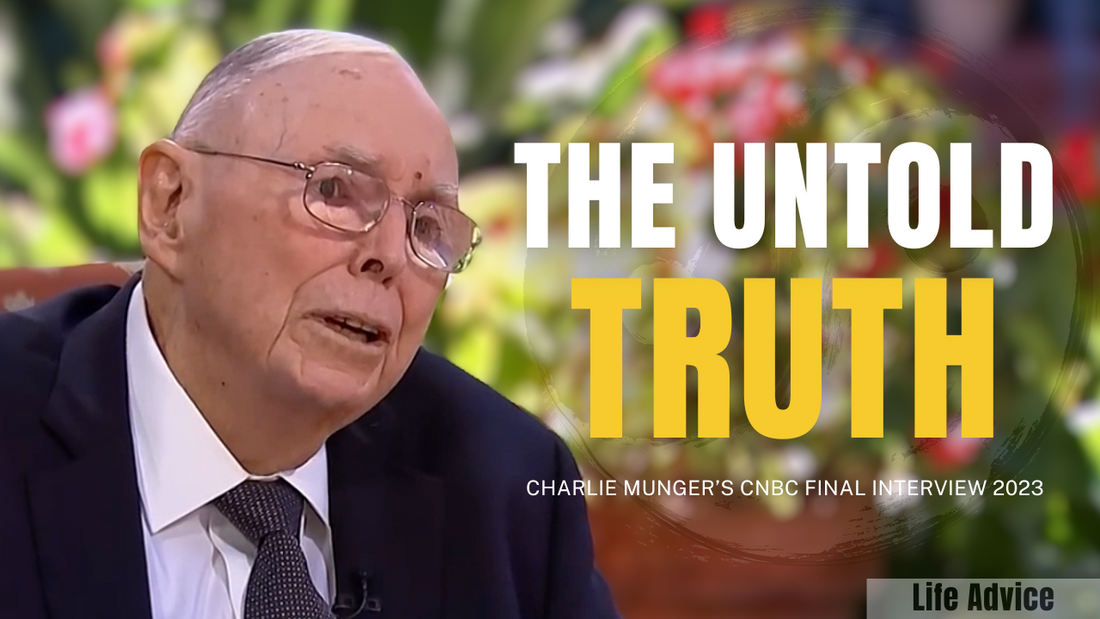
Charlie Munger: Why Trying to Fix the World Can Make It Worse | Final Interview with CNBC 2023
[Transcript]
BECKY QUICK: You’ve said that a proper incentive structure should be set up for public policy, too, and that you have to think about it very carefully. If you want to go into public policy, you should go in and think about what the end results are going to be from the actions that you take.
CHARLIE MUNGER: It’s not only that, but once you get in the business of saying we’re going to make it fairer so that the hardships of life are more widely distributed — you can call it fairer or you can call it more generous — but, either way, they mean the same thing. They want the hardships of life to be mitigated for some people.
That means other people can sell things to the government that they use in helping unfortunate people. And people have a different idea about the government. They think mildly cheating the government is alright — it’s a big, dumb bureaucracy. They are engaged in manipulating us so that they can live well. Of course we can flag a little so we can live well — and, therefore, it’s okay to cheat the government.
And the cheating of the government is so extreme. If I could just wave a wand and take all the cheating out of the workman's comp system — Who can not be in favor of the workman’s comp system so that if you’re injured in the course of doing your job — that makes you a living and feeds your children — and now you can’t function for a while, the government will reach down and give you a lifting hand?
That’s why they created compulsory workman’s comp insurance — because it just seemed unfair that some people got so utterly clobbered by things that weren’t their fault. Yet that wonderful system, it is rife with fraud. They puff their injuries up so they can get time off. They puff their injuries up so they can have extra cash. They puff their injuries up so they can get permanent disability pay.
And they have doctors and lawyers that help them do it — I mean mislead the government with an unfair appearance so that in an effort to cure an unfairness. We may find that there are whole areas where the way human nature works, we have to endure more hardship and the unfairness that comes with it.
The ordinary rich person who talks that way is talking because he wants to hold all his wealth and keep a great — and make the disparity between his wealth and all the ordinary people get greater and greater. That’s his ambition. But it isn’t worth that he gets what he wants.
The ordinary outcome of the well-to-do families is they go back to the mean. If you looked at somebody as rich as the Rockefellers — and that was really rich by the standards of ordinary human beings — even the Rockefellers will eventually go back to the mean. Pretty close, anyway. It just happens. There’s a lot of misfortune out there that — both fiscal and other kinds — and it takes you down one after another.
BECKY QUICK: Henry Ford and John D. Rockefeller were the richest people in the world when you were born in 1924. Today, it’s Elon Musk. Is it just new people who come through the system?
CHARLIE MUNGER: I don’t regard Elon Musk as truly that rich because I don’t think it’s sure that everything he’s working on can work. I think he can get his ass handed to him on autos. I would not invest in Elon Musk’s autos myself.
BECKY QUICK: But you’ve been impressed by what he’s built.
CHARLIE MUNGER: Yes, well, who cannot? Again, that’s another lesson. What is the lesson of Elon Musk? Somebody who has a perfectly ridiculous amount of money and almost always has an element of luck in him. He’s been quite lucky in what he’s picked to double down, double down, double down — and then he’s used leverage so much that he has doubled down right to the edge of extinction maybe two or three times.
How many people can go to the edge of extinction without stepping into it? Well, he’s done it three times. Maybe he’s got six more in him — I don’t know. I put Elon Musk in a [too hard] pile. I never bet against him, but I never bet with him. As far as I’m concerned, he doesn’t exist. My life works better if I treat the world as though he didn’t exist.
Source: https://youtu.be/H5Oom5Rjp_Y?si=ZEkkZkAN6WyOWcl9
[YAPSS Takeaway]
Charlie Munger’s message echoes Laozi’s Dao: trying too hard to fix or control the world often backfires. Human nature doesn’t change, and too many rules invite abuse. Wealth is temporary, fairness can’t be forced, and chasing power or perfection only brings stress. Instead, live simply, stay humble, accept life’s ups and downs, and follow the natural flow.
